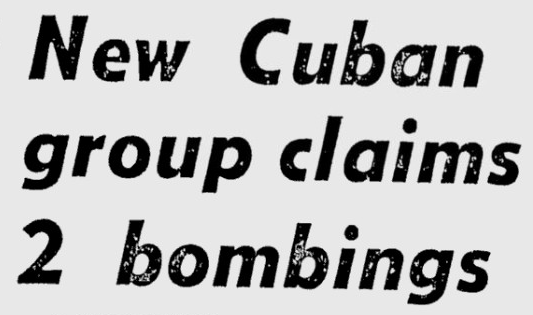________
In 1971 - the same year U.S. Senator Marco Rubio was born - LIFE magazine
published a piece that highlighted the successes of newly-arrived Cubans in Miami.
At a rate unprecedented among America's major immigrant groups, the 350,000 Cubans in the Miami area have transformed themselves into a thriving prosperous community. They comprise a fourth of the area's population, and their average income has risen to a healthy $8,000 for each family. More than half own their own houses, and they pump a total of $600 million a year into the local economy. Cubans own more than one out of three retail businesses in the city, and have created 6,000 new ones.
The Cuban presence is everywhere in Miami. Much of the city today looks, smells and sounds like Havana...
[...]
Today many Cubans still talk wistfully of returning to their homeland. But it is doubtful that many would return if they had a chance.
________
Marco Rubio is understandably proud of his Cuban roots.
In 2011, the
Washington Post reported his parents "came to the United States and were admitted for permanent residence more than two-and-a-half years before Castro’s forces overthrew the Cuban government and took power on New Year’s Day 1959."
However, on
his website, Rubio says he "was born in Miami to Cuban-born parents who came to America
following Fidel Castro's takeover." [
Emphasis mine.]
Rubio told
the Miami Herald's Marc Caputo, “I didn’t lie about the date. I wasn’t aware of it.”
In his recollection of history, Rubio tends leave out the parts that don't fit his narrative.
Perhaps that accounts for Rubio's memory lapse last Wednesday, when, in
reacting to President Barack Obama's decision to restore diplomatic relations with Cuba, the Senator said this: "Cuba, like Syria, Iran, and Sudan, remains a state sponsor of terrorism."
And what Rubio leaves out in his recounting of the Cuban-American success story in Miami, is the ugly and violent side of the saga.
The fact is that while many newly-arrived Cubans were building new lives and fortunes in Miami, some were engaging in terrorism that kept the city on edge for almost three decades.
In
an article posted Friday on Foreign Policy magazine's website, journalist Tristram Korten writes:
For decades, Miami has been a city with its own foreign policy. Local politicians could not get elected unless they towed the anti-Castro line, and their complicity enabled a violent history. Since the 1970s, there have been more than 30 bombings in and around Miami, against individuals and press outlets that dared to broach the subject of rapprochement, not to mention death threats and physical assaults. Too often, it seemed, those pushing for freedom in Cuba were willing to suspend them here. As a result, civic life, the free exchange of ideas, art, all suffered.
________
Note to Senator Rubio: Next time you want to use history to make a point, why not include all of it?



















No comments:
Post a Comment
Feel free to comment on anything you read here.
All comments must first be approved. Spam and spam links will not be tolerated or approved.